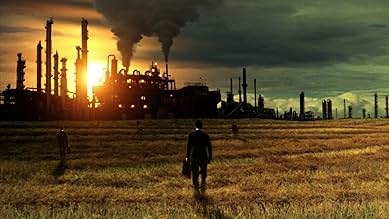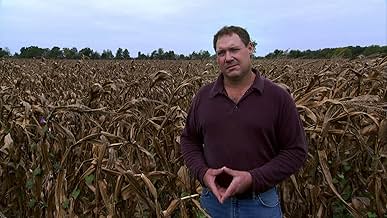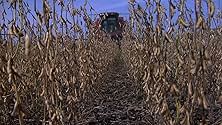IMDb-BEWERTUNG
7,8/10
52.903
IHRE BEWERTUNG
Ein wenig schmeichelhafter Blick in Amerikas konzerngesteuerte Lebensmittelindustrie.Ein wenig schmeichelhafter Blick in Amerikas konzerngesteuerte Lebensmittelindustrie.Ein wenig schmeichelhafter Blick in Amerikas konzerngesteuerte Lebensmittelindustrie.
- Regie
- Drehbuch
- Hauptbesetzung
- Für 1 Oscar nominiert
- 7 Gewinne & 20 Nominierungen insgesamt
Empfohlene Bewertungen
Greetings again from the darkness. Was reticent to see this one thinking I might never want to eat again. Much of what is in the film is not really new, but the entire segment on corn was really an eye opener.
No real surprise that a few giant companies, with governmental subsidies, control our entire food market ... and that it run like a giant factory and not Grandpa's farm. Still it is painful to watch what the workers and animals and farmers are subjected to.
The two messages we are left with - push the government for better controls and power by the FDA and USDA, and eat more organic food ... even if it is more expensive.
No real surprise that a few giant companies, with governmental subsidies, control our entire food market ... and that it run like a giant factory and not Grandpa's farm. Still it is painful to watch what the workers and animals and farmers are subjected to.
The two messages we are left with - push the government for better controls and power by the FDA and USDA, and eat more organic food ... even if it is more expensive.
"Faster, fatter, bigger, cheaper." A farmer describes fast food folly.
Although I would like to call Food, Inc. a horror film, I must relax my delicate eating sensibilities to call it a disturbing documentary. Images of little chickens hanging like laundry on conveyor cables above fast-moving assembly lines and cows patiently standing knee high in feces have changed my attitude toward grilling.
Robert Kenner's Food, Inc. isn't half the fun of a Michael Moore doc in which the infamous director savages everyone from auto execs to neocons. Kenner is more credible because he doesn't viciously pursue any one official, just the food industry itself (and McDonald's more than any other), which has become oligarchic and impersonal, endangering the quality and safety of consumers. Unlike Moore, Kenner has no sense of humor.
Like almost all documentarians, Kenner smartly offers ways to change the barbaric methods and marketing of food. In truth too little praise is given to the food giants that have provided good nutrition and cheaper food in an amazing harvesting that can feed the world. Narrator/interviewer Eric Schlosser (Fast Food Nation) and scientist Michael Pollan (UC Berkeley) modestly present their cases for food abuse such as the demand in corporations like McDonalds for "faster, fatter, bigger, cheaper."
On the point of treating animals with kindness, the documentary has encouraged me to consider vegetables.
Although I would like to call Food, Inc. a horror film, I must relax my delicate eating sensibilities to call it a disturbing documentary. Images of little chickens hanging like laundry on conveyor cables above fast-moving assembly lines and cows patiently standing knee high in feces have changed my attitude toward grilling.
Robert Kenner's Food, Inc. isn't half the fun of a Michael Moore doc in which the infamous director savages everyone from auto execs to neocons. Kenner is more credible because he doesn't viciously pursue any one official, just the food industry itself (and McDonald's more than any other), which has become oligarchic and impersonal, endangering the quality and safety of consumers. Unlike Moore, Kenner has no sense of humor.
Like almost all documentarians, Kenner smartly offers ways to change the barbaric methods and marketing of food. In truth too little praise is given to the food giants that have provided good nutrition and cheaper food in an amazing harvesting that can feed the world. Narrator/interviewer Eric Schlosser (Fast Food Nation) and scientist Michael Pollan (UC Berkeley) modestly present their cases for food abuse such as the demand in corporations like McDonalds for "faster, fatter, bigger, cheaper."
On the point of treating animals with kindness, the documentary has encouraged me to consider vegetables.
It is said that if you like eating sausage, you better not see how it is made. If you like eating meat, don't watch an animal being killed. If you have your fill of fruits and vegetables daily, don't think about the pesticides that coat them.
Our modern society has sanitized the presentation of food so that we can blissfully ignore what we should be concerned with: where food comes from, how it is raised, picked, handled, altered, transported and sold. Instead our attention is focused only on the awesome number of beautiful packages on market shelves, the unblemished fruits and vegetables available year round. In our increasingly artificial world appearance trumps taste, price trumps provenance, and industrialization gives us a false sense of safety.
It is therefore opportune to have the release of "Food, Inc". After you see it, you'll probably not shop for food in the same way. You may even change the kinds of food you eat. Not enough to convince me to become a vegetarian, but the ubiquitousness of corn and its derivatives, stated multiple times in the film, has made scouring of package labels a routine. The easy rule of not buying anything that contains more than five ingredients more frequently obeyed.
The film contains material that has already been brought out by others, for examples, (1) the problem of genetically modified seeds crossing into properties that do not want them and (2) the appalling conditions in which farm animals are kept. Some material is stressed too much, for example, the whole issue surrounding the tragic death of a kid from a very virulent form of E.coli and the attempts to establish regulations that might prevent such deaths. Individual cases are worth mentioning, but systemic and widespread issues are more compelling. The death of one is no doubt a tragedy but the impairment of thousands is of greater social consequence.
The issue of food regulation in general is a subject that I would have liked to see more of. The adverse effect of more regulation (as per the example above) can be too much regulation. The subject is briefly broached by the "good farmer" (Joel Salatin) who kills his chickens in the open. Ironically those chickens are likely to be more healthy and tasty. Regulation may eliminate this practice. Regulation can therefore have a negative impact on food culture. One of the best example of this is preventing the importation into the US of many delicious young unpasteurized cheese from Europe or even the marketing of such cheese by US producers. How many get sick from those cheese compared to the number of sick from peanut butter or spinach?
The film unwittingly projects a bit of naiveté in a couple of places. The segment about an individual being sued by a food conglomerate and essentially losing for lack of money is not news. This is a capitalist system: more money, better lawyers, almost certain victory. Yet the point is well taken that the food conglomerates are behaving in thuggish ways and acting with the protection of a complicit government (the best money can buy). But again, uncontrolled capitalism generates monopolies and they will fight tooth and nail to retain control and squash any semblance of competition. It's the logic of the beast. This not limited to food. Since voting habits have brought the US to this state of affairs, our only recourse as consumers is to eat bananas, and only bananas, for breakfast, lunch and dinner. It's called the Chiquita Diet.
In any case, this is a must-see documentary. The director is to be commended for having the courage of tackling this very important topic.
Don't forget to buy a five gallon basket of popcorn dripping with oleo and a big soda with plenty of high fructose corn syrup before going into the screening room. It may be the last time you do.
Our modern society has sanitized the presentation of food so that we can blissfully ignore what we should be concerned with: where food comes from, how it is raised, picked, handled, altered, transported and sold. Instead our attention is focused only on the awesome number of beautiful packages on market shelves, the unblemished fruits and vegetables available year round. In our increasingly artificial world appearance trumps taste, price trumps provenance, and industrialization gives us a false sense of safety.
It is therefore opportune to have the release of "Food, Inc". After you see it, you'll probably not shop for food in the same way. You may even change the kinds of food you eat. Not enough to convince me to become a vegetarian, but the ubiquitousness of corn and its derivatives, stated multiple times in the film, has made scouring of package labels a routine. The easy rule of not buying anything that contains more than five ingredients more frequently obeyed.
The film contains material that has already been brought out by others, for examples, (1) the problem of genetically modified seeds crossing into properties that do not want them and (2) the appalling conditions in which farm animals are kept. Some material is stressed too much, for example, the whole issue surrounding the tragic death of a kid from a very virulent form of E.coli and the attempts to establish regulations that might prevent such deaths. Individual cases are worth mentioning, but systemic and widespread issues are more compelling. The death of one is no doubt a tragedy but the impairment of thousands is of greater social consequence.
The issue of food regulation in general is a subject that I would have liked to see more of. The adverse effect of more regulation (as per the example above) can be too much regulation. The subject is briefly broached by the "good farmer" (Joel Salatin) who kills his chickens in the open. Ironically those chickens are likely to be more healthy and tasty. Regulation may eliminate this practice. Regulation can therefore have a negative impact on food culture. One of the best example of this is preventing the importation into the US of many delicious young unpasteurized cheese from Europe or even the marketing of such cheese by US producers. How many get sick from those cheese compared to the number of sick from peanut butter or spinach?
The film unwittingly projects a bit of naiveté in a couple of places. The segment about an individual being sued by a food conglomerate and essentially losing for lack of money is not news. This is a capitalist system: more money, better lawyers, almost certain victory. Yet the point is well taken that the food conglomerates are behaving in thuggish ways and acting with the protection of a complicit government (the best money can buy). But again, uncontrolled capitalism generates monopolies and they will fight tooth and nail to retain control and squash any semblance of competition. It's the logic of the beast. This not limited to food. Since voting habits have brought the US to this state of affairs, our only recourse as consumers is to eat bananas, and only bananas, for breakfast, lunch and dinner. It's called the Chiquita Diet.
In any case, this is a must-see documentary. The director is to be commended for having the courage of tackling this very important topic.
Don't forget to buy a five gallon basket of popcorn dripping with oleo and a big soda with plenty of high fructose corn syrup before going into the screening room. It may be the last time you do.
The Center for Disease Control and Prevention has estimated that foodborne diseases cause approximately 76 million illnesses, 325,000 hospitalizations, and 5,000 deaths in the United States each year. If you are the mother of two-year-old Kevin Kowalcyk who died in 2001 after eating a hamburger contaminated with E. Coli, however, statistics do not tell the story of crushing personal loss. The tragedy of Kevin's premature death spurred legislation (known as Kevin's Law) introduced by Rep. Anna G. Eshoo, D-Palo Alto, that would give the U.S. Department of Agriculture the power to close down plants that produce contaminated meat but it has failed repeatedly to pass the U.S. Congress because of opposition from the meat industry.
E-Coli outbreaks and other food-safety related issues are discussed in the outstanding documentary Food, Inc., directed by Robert Kenner, a film, graphic in part, that may leave you with a severe case of indigestion. Kenner is an unabashed advocate for greater food safety and the film with commentary by Eric Schlosser (Fast Food Nation) and Michael Pollan (The Omnivore's Dilemma).attempts to convince the public of the shortsightedness of the mega-corporations that dominate the food industry and their "faster, fatter, bigger, cheaper," method of increasing profits often at the expense of public safety. Representatives from food-producing giants such as Monsanto, Smithfield, Tyson and Perdue that control our food supply were invited to be interviewed for the film but declined or did not respond to Kenner's request. According to Schlosser, "The industry doesn't want you to know the truth about what you're eating - because if you knew, you might not want to eat it."
Interviewing farmers and ranchers, Kenner learned that they are mostly at the mercy of mega-corporations like Monsanto which have increased their share of the soybean market from 2% to 90% in the last decade. Monsanto developed their own custom gene for soybeans and now threaten their customers with lawsuits for patent infringement if they save their own seeds to use the next year. The film observes that part of the reason why the food industry is so hard to regulate is that many of the government officials currently assigned to watchdog roles were once employed by the companies they now monitor and notes that FDA food inspections have plummeted from 50,000 in 1972 to 9,200 in 2006.
Other subjects covered are the treatment of cows that are forced to eat corn instead of grass (which then goes into Coke, high fructose corn syrup, diapers, decongestants, and batteries) and the dreadful conditions of chickens that are herded into darkened cages before they are slaughtered. On that subject, Kenner interviews Carole Morrison who was unwilling to jam her chickens into cages without sunlight and, as a result, had her contract canceled by a giant chicken conglomerate who refused to have any further business dealings with her. Also discussed are the growing rates of diabetes in young people, the soaring incidence of obesity, and the use of low paying illegal immigrants to work in the food processing industry.
In spite of the horror stories, however, Food, Inc. is not depressing and Kenner seems more interested in educating the public than frightening them. He shows that people can make a difference by citing the tobacco industry as well as the efforts of an entrepreneur from Stonyfield Farms who sold his line of organic products to Wal-Mart and a Virginia farmer who insists on raising animals with dignity and respect. To the strain of Bruce Springsteen singing Woody Guthrie's "This Land is Your Land", advice on how individuals can make a difference include – buy locally, shop in farmer's markets where possible, seek out quality and organic products even if they cost a bit more, and be sure to read the labeling to learn where a product comes from and the ingredients it contains.
Food, Inc. by itself may not be the catalyst that will preserve our health and well being and make food taste the way it did fifty years ago, but it is an important start and should be seen by anyone who eats, that means all of us. As the director puts it, "I think we're beginning to see the dangers of this inexpensive food that these big agribusinesses are producing. And the more we can see the cracks in this system, the faster it's going to fall apart. I'm hoping that this film can help people to start to think about it People are becoming much more conscious of their food, and the more we think about it, the more good food we're going to get." I'll vote for that.
E-Coli outbreaks and other food-safety related issues are discussed in the outstanding documentary Food, Inc., directed by Robert Kenner, a film, graphic in part, that may leave you with a severe case of indigestion. Kenner is an unabashed advocate for greater food safety and the film with commentary by Eric Schlosser (Fast Food Nation) and Michael Pollan (The Omnivore's Dilemma).attempts to convince the public of the shortsightedness of the mega-corporations that dominate the food industry and their "faster, fatter, bigger, cheaper," method of increasing profits often at the expense of public safety. Representatives from food-producing giants such as Monsanto, Smithfield, Tyson and Perdue that control our food supply were invited to be interviewed for the film but declined or did not respond to Kenner's request. According to Schlosser, "The industry doesn't want you to know the truth about what you're eating - because if you knew, you might not want to eat it."
Interviewing farmers and ranchers, Kenner learned that they are mostly at the mercy of mega-corporations like Monsanto which have increased their share of the soybean market from 2% to 90% in the last decade. Monsanto developed their own custom gene for soybeans and now threaten their customers with lawsuits for patent infringement if they save their own seeds to use the next year. The film observes that part of the reason why the food industry is so hard to regulate is that many of the government officials currently assigned to watchdog roles were once employed by the companies they now monitor and notes that FDA food inspections have plummeted from 50,000 in 1972 to 9,200 in 2006.
Other subjects covered are the treatment of cows that are forced to eat corn instead of grass (which then goes into Coke, high fructose corn syrup, diapers, decongestants, and batteries) and the dreadful conditions of chickens that are herded into darkened cages before they are slaughtered. On that subject, Kenner interviews Carole Morrison who was unwilling to jam her chickens into cages without sunlight and, as a result, had her contract canceled by a giant chicken conglomerate who refused to have any further business dealings with her. Also discussed are the growing rates of diabetes in young people, the soaring incidence of obesity, and the use of low paying illegal immigrants to work in the food processing industry.
In spite of the horror stories, however, Food, Inc. is not depressing and Kenner seems more interested in educating the public than frightening them. He shows that people can make a difference by citing the tobacco industry as well as the efforts of an entrepreneur from Stonyfield Farms who sold his line of organic products to Wal-Mart and a Virginia farmer who insists on raising animals with dignity and respect. To the strain of Bruce Springsteen singing Woody Guthrie's "This Land is Your Land", advice on how individuals can make a difference include – buy locally, shop in farmer's markets where possible, seek out quality and organic products even if they cost a bit more, and be sure to read the labeling to learn where a product comes from and the ingredients it contains.
Food, Inc. by itself may not be the catalyst that will preserve our health and well being and make food taste the way it did fifty years ago, but it is an important start and should be seen by anyone who eats, that means all of us. As the director puts it, "I think we're beginning to see the dangers of this inexpensive food that these big agribusinesses are producing. And the more we can see the cracks in this system, the faster it's going to fall apart. I'm hoping that this film can help people to start to think about it People are becoming much more conscious of their food, and the more we think about it, the more good food we're going to get." I'll vote for that.
With family run farms pretty much a thing of the past, institutional farming has pretty much taken over,and the dim,dark & dismal effects are omnipresent. There is an epidemic of food borne illness,due to cattle being exposed to over use of steroids to make them grow fatter, faster (and this also includes chickens,pigs,etc.),not to mention GMO corn,grains,etc. Robert Kenner's eye opening film, 'Food,Inc.' manages to shine at least some light on some pretty unethical practices that are being undertaken by corporate owned & managed farms. The likes of Eric Schlosser (author of 'Fast Food Nation',which was made into a semi fictional film a few years back)is featured in interviews,along with Michael Pollan. Many fingers are pointed at guilty parties doing the dirty deeds of the farming industry,along with some pretty unpleasant footage of unethical practices (i.e. abuse of farm animals, although this film doesn't take up any kind of vegetarian/vegan agenda of it's own---the viewer can make up their own mind just what they prefer to eat). Much to my surprise,there is little discussion of the mad cow disease epidemic (or,BSE)from a few years back (only a passing reference). Rated PG by the MPAA,this film contains some unpleasant footage of animal abuse,as well as a rude word,or two. Okay for older children who care about what's on their plate for breakfast,lunch or dinner.
Wusstest du schon
- WissenswertesOn the Region 1 DVD packaging, the UPC bar-code on the cow is different from the one shown on the theatrical poster. The bar-code on the poster is 4-73762-52481-6-(18). The bar-code on the Region 1 DVD packaging is 8-76964-00216-5 : the same bar-code that appears on the back cover of the DVD. As of 2022, the bar-code used on the poster is not an active code.
- Zitate
Michael Pollan: There are no seasons in the American supermarket. Now there are tomatoes all year round, grown halfway around the world, picked when it was green, and ripened with ethylene gas. Although it looks like a tomato, it's kind of a notional tomato. I mean, it's the idea of a tomato.
- VerbindungenFeatured in Durch die Nacht mit...: Tim Raue und Dave Arnold (2009)
- SoundtracksSunny L.A.
Written by Nancy Peterson
Performed by Great American Swing Band
Top-Auswahl
Melde dich zum Bewerten an und greife auf die Watchlist für personalisierte Empfehlungen zu.
- How long is Food, Inc.?Powered by Alexa
Details
- Erscheinungsdatum
- Herkunftsland
- Offizieller Standort
- Sprache
- Auch bekannt als
- Food, Inc. - Was essen wir wirklich?
- Drehorte
- Produktionsfirmen
- Weitere beteiligte Unternehmen bei IMDbPro anzeigen
Box Office
- Bruttoertrag in den USA und Kanada
- 4.417.674 $
- Eröffnungswochenende in den USA und in Kanada
- 60.513 $
- 14. Juni 2009
- Weltweiter Bruttoertrag
- 4.606.199 $
- Laufzeit
- 1 Std. 34 Min.(94 min)
- Farbe
- Sound-Mix
- Seitenverhältnis
- 1.78 : 1
Zu dieser Seite beitragen
Bearbeitung vorschlagen oder fehlenden Inhalt hinzufügen
























